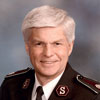
Born Fred McFeely in Latrobe, Pennsylvania, Fred Rogers felt called to the ministry. He graduated from Pittsburgh Theological Seminary and was ordained a minister in the Presbyterian Church. Mister Rogers, as he became known and loved by millions, was a gentle man, who spoke directly to children. Each of the 895 TV episodes began the same way with Mister Rogers walking into his home, changing into sneakers and a zippered cardigan sweater while singing his theme song, Won't You Be My Neighbour?
The show remains an endearing inspiration to connect with those in our neighbourhoods. What a concept—relaxing our mind and body, hanging up our coats, putting on our sweaters, replacing our good shoes with sneakers and actually smiling while building relationships with those around! Is this a daydream or a possibility in our busy and demanding contemporary lives?
The Early Church taught and practised the biblical concept of reaching out to neighbours:
They (the new Christians) devoted themselves to the apostles' teaching and to the fellowship, to the breaking of bread and to prayer…. They broke bread in their homes and ate together with glad and sincere hearts, praising God and enjoying the favour of all the people (Acts 2:42, 46-47).
What about today? We live in a different age and culture. Brian McLaren responds to this question in his book The Church on the Other Side: “The ultimate community is not just the church itself…. The church [is] a catalyst of a larger reality, which Jesus called the Kingdom of God … dynamic Christian communities … a catalyst of blessing for the good of the world.”
We all agree with the concept, but we often go home at night and routinely lock our doors, shutting out the world and our surrounding neighbourhood. While locking the door is a necessary precaution today, the critical question is not reasonable security, but compassionate outreach.
“In the morning we cannot yet know who our neighbour will be that day,” writes Dallas Willard in The Divine Conspiracy. “The condition of our hearts will determine who along our path turns out to be our neighbour, and our faith in God will largely determine whom we have strength enough to make our neighbour.” Christ wants to shine through us throughout our neighbourhood.
One of my favourite theologians is Dietrich Bonhoeffer, who lived only 39 years, and yet had such a profound impact on his and future generations. In his book Life Together, he sagely notes: “In a Christian community everything depends upon whether each individual is an indispensable link in a chain. Only when even the smallest link is securely interlocked is the chain unbreakable.”
May Jesus ever say through you and me:
It's a beautiful day in this neighbourhood.
A beautiful day for a neighbour,
Would you be mine? Could you be mine?
May we continue to reach out, show kindness, give hospitality, extend friendship and be gentle in the name of Jesus:
Won't you please, won't you please?
Please won't you be my neighbour?
Our communities provide unlimited opportunities for us as we strive to reach out and embrace one another, for the sake of Christ and his glorious Kingdom!
And the Lord added to their number daily those who were being saved (Acts 2:47).
 Commissioner William W. Francis is the Territorial Commander of The Salvation Army Canada and Bermuda Territory. His wife, Commissioner Marilyn Francis, is the Territorial President for Women's Ministries. Commissioners Francis have two adult children, Captain William Marshall and Susan Marjorie, plus six grandchildren.
Commissioner William W. Francis is the Territorial Commander of The Salvation Army Canada and Bermuda Territory. His wife, Commissioner Marilyn Francis, is the Territorial President for Women's Ministries. Commissioners Francis have two adult children, Captain William Marshall and Susan Marjorie, plus six grandchildren.









Leave a Comment